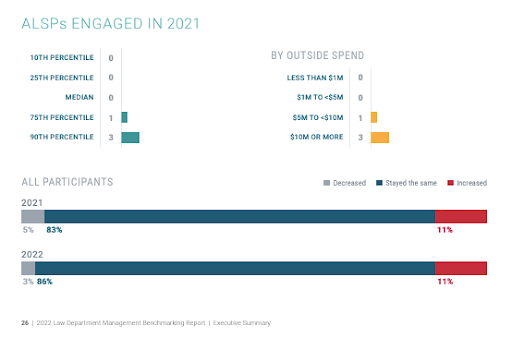Legal Procurement: A Comprehensive Guide
It wasn’t that long ago that in-house legal teams would balk at including their organization’s procurement department in their purchasing processes.
There was a perception that procurement only looked for the lowest-cost option. On the other hand, the in-house team was focused on partnering with outside counsel that would drive the right outcomes for their business, prioritizing firms they had trusted relationships with. This meant that quality typically trumped cost considerations.
While relationships are still important, legal tech has evolved to provide clear insight into legal work and spend. In-house teams can now rely on data as a primary reason to stay with a vendor or make a change. Couple that data with the skills of your organization’s procurement department, and you can establish a more effective vendor acquisition strategy.
What is Legal Procurement?
Legal procurement is the process of identifying, vetting, and contracting with legal service providers. The in-house legal team, including legal ops, works with the company’s procurement team to negotiate with potential legal services vendors and handle the RFP process if needed.
Ideally, it is a collaboration that brings together the procurement team’s negotiation skills and experience researching vendors with the legal department’s domain expertise.
Legal procurement differs from general procurement in a couple of ways:
- Procurement’s goal is to save the organization money. The department often focuses on streamlining the purchase process and finding the lowest-cost provider. Their directive is what’s best for the company as a whole, and they typically don’t have insight into the goals of the legal department.
- Legal procurement is a subset of general procurement. Legal procurement professionals have to take into account more than just hard cost savings. When evaluating outside counsel, they need to consider the area of expertise of the firm, the availability of staff, the quality of their work, and the current relationship with the in-house team. Legal procurement acknowledges that performing legal work to the right standard and quality can save countless dollars in the long run.
- Legal procurement doesn’t typically fit into the standard processes of general procurement. Legal services may require more specialized RFPs based on the expertise needed, such as when dealing with a high-risk, high-cost matter. Often, legal services contracts require domain-specific knowledge to negotiate.
Legal ops have detailed metrics on spend management and outside counsel performance that can aid the legal procurement process, changing what used to be a mostly relationship-based selection process into one that is data-driven.
Why Legal Procurement is Important
When done correctly, legal procurement can improve the quality of legal services provided, decrease legal spend, and build trust with your larger organization. Here are five ways legal procurement can positively impact your sourcing decisions.
Better Cost Control
By following established and approved rules, automation, and benchmarks, you can objectively evaluate your options and make sure you are getting the most value for the spend. You can better negotiate and lower overall costs by streamlining your vendors through the standard processes.
According to the Buying Legal Services Survey, companies save 21%, on average, when the in-house team and procurement are well-aligned. Just having the general procurement team involved can save 14% on legal spend.
Improved Legal Services Quality
Legal procurement enables legal departments to do their work to the right level of quality. Without legal procurement, in-house counsel may default to sending straightforward, routine work to high-cost outside counsel because they have a relationship with that firm. While that firm may still be selected for complex, high-risk work under legal procurement, the more routine work can be directed to lower-cost legal service providers that are qualified for the low-risk work.
Efficient Contract Negotiation
General procurement negotiates details with potential vendors daily and can manage the minutiae of the negotiation process. They have the skills and experience to negotiate volume discounts and add-on free services like training from firms or better hourly rates.
Shared Duties Based on Skill Set
If done well, the organizational procurement team can take care of many of the non-legal tasks and project management, bringing in the legal team only for specific needs. For example, once the in-house legal team provides the appropriate parameters, the procurement department can handle the back-and-forth of the fee structure negotiation. This keeps the in-house team focused on more strategic work.
Improved Trust Within Your Organization
The procurement department and in-house legal can learn from each other and establish a shared understanding of priorities. The organization can see that legal is taking cost control seriously by going through the procurement process.
Types of Legal Procurement
Legal procurement is the purchasing of legal services that fall outside of the traditional procurement process, and includes tasks like outside counsel selection and optimization.
Selecting New Outside Counsel
You will need to start the legal procurement process if you are presented with a high-cost matter or a new type of work that is outside the area of expertise of your in-house attorneys and current vendors. Or your team may already be stretched too thin and can’t take on an increased number of matters, and may look to add a new vendor to help cover this work.
Consolidating Your Panel of Law Firms
Most in-house firms work with about ten outside-counsel vendors on a regular basis, but their slate of outside counsel firms can be in the hundreds. Using legal ops data, you may find opportunities to move more work to a smaller number of vendors so you can negotiate better rates, discounts, or alternative fee arrangements.
Identifying More Efficient Service Providers
Many in-house teams are incorporating Alternative Legal Service Providers (ALSPs) into their vendor panel because these technology-focused legal companies can provide value and keep costs down. ALSPs can cover high-volume, low-risk, routine tasks such as e-discovery and document review, saving on outside counsel costs.
The ACC’s 2022 Law Department Management Benchmarking Report found that more than 80% of respondents use at least one ALSP, up 11% year over year.

Use data from your legal spend management tool to determine whether you can move routine tasks from higher-cost firms to an ALSP at a lower cost.
A note on legal tech: Legal technology procurement typically follows normal company processes for buying software for the company, so it isn’t considered legal procurement.
Best Practices in Legal Procurement
From creating a standardized legal RFP to using automation to keep the process moving smoothly, there are a few ways to make legal procurement as painless as possible.
Create a Partnership
The most important step is to view legal procurement as a partnership. Spend time learning the basics of your procurement team’s workflow. Show them what you are looking for in legal services and understand what the general procurement department cares about, such as saving money and following standard processes.
Consider a Legal RFP
Consider using a legal RFP to effectively compare law firms’ experience, skills, and rates in a measurable way. Your legal RFP should clearly explain what services you need and the price structure you want, request information about staffing and the legal strategy you are looking for, and outline your timeline.
Establish a Communication Process
Another best practice is to develop a structured communication process with your procurement team. Identify a point person for the procurement team to work with, either by a step in the process or a single person to manage each purchase. Clearly define when legal needs to review a contract or negotiate terms and who has the authority to approve. Make it clear that legal has the final say. This helps you avoid an influx of minor tasks that the procurement team can manage and keeps contracts moving through the process smoothly.
Make Good Use of Your Legal Tech
Finally, leverage technology to automate and provide data-driven recommendations. Share your legal data analytics for your vendors, especially any current vendors you are evaluating. Include any general benchmarking studies you’ve done. It can help explain what good looks like and provide data-backed reasons for why you are making the change.
Continual Optimization With Brightflag
If your organization has a procurement group, partnering with them on legal procurement could save you time and decrease your legal spend on legal services. But legal procurement doesn’t stop when the contract is signed. Using your legal spend management software, you’ll be able to constantly review and evaluate your vendors so you can continue to optimize.
Learn more about how Brightflag can help you analyze spend and measure the value your in-house team is getting from your vendors. Sign up for a demo today.



